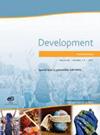报纸背后的人物 - Maarten Bebelman、Lenka Belicova 和 Marino Zerial。
IF 3.7
2区 生物学
Q1 DEVELOPMENTAL BIOLOGY
引用次数: 0
摘要
肝母细胞是肝细胞的双潜能祖细胞,可分化为肝细胞或胆管细胞。在他们的研究中,Marino Zerial 及其同事揭示了肝母细胞的极化和管腔形态发生如何与肝细胞命运决定相关联。为了进一步了解他们的工作,我们采访了第一作者 Maarten Bebelman 和 Lenka Belicova,以及通讯作者、马克斯-普朗克分子细胞生物学和遗传学研究所所长兼科学成员 Marino Zerial。本文章由计算机程序翻译,如有差异,请以英文原文为准。
The people behind the papers - Maarten Bebelman, Lenka Belicova and Marino Zerial.
Hepatoblasts are the bipotential progenitors of liver cells that differentiate into either hepatocytes or cholangiocytes. In their study, Marino Zerial and colleagues reveal how hepatoblast polarisation and lumen morphogenesis are linked to hepatocyte cell fate determination. To know more about their work, we spoke to the first authors, Maarten Bebelman and Lenka Belicova, and the corresponding author, Marino Zerial, Director and Scientific Member at the Max Planck Institute of Molecular Cell Biology and Genetics.
求助全文
通过发布文献求助,成功后即可免费获取论文全文。
去求助
来源期刊

Development
生物-发育生物学
CiteScore
6.70
自引率
4.30%
发文量
433
审稿时长
3 months
期刊介绍:
Development’s scope covers all aspects of plant and animal development, including stem cell biology and regeneration. The single most important criterion for acceptance in Development is scientific excellence. Research papers (articles and reports) should therefore pose and test a significant hypothesis or address a significant question, and should provide novel perspectives that advance our understanding of development. We also encourage submission of papers that use computational methods or mathematical models to obtain significant new insights into developmental biology topics. Manuscripts that are descriptive in nature will be considered only when they lay important groundwork for a field and/or provide novel resources for understanding developmental processes of broad interest to the community.
Development includes a Techniques and Resources section for the publication of new methods, datasets, and other types of resources. Papers describing new techniques should include a proof-of-principle demonstration that the technique is valuable to the developmental biology community; they need not include in-depth follow-up analysis. The technique must be described in sufficient detail to be easily replicated by other investigators. Development will also consider protocol-type papers of exceptional interest to the community. We welcome submission of Resource papers, for example those reporting new databases, systems-level datasets, or genetic resources of major value to the developmental biology community. For all papers, the data or resource described must be made available to the community with minimal restrictions upon publication.
To aid navigability, Development has dedicated sections of the journal to stem cells & regeneration and to human development. The criteria for acceptance into these sections is identical to those outlined above. Authors and editors are encouraged to nominate appropriate manuscripts for inclusion in one of these sections.
 求助内容:
求助内容: 应助结果提醒方式:
应助结果提醒方式:


